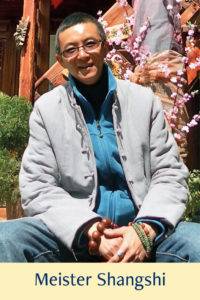Master Shangshi
 Already during childhood Master Shangshi felt a desire for inner freedom, as he observed how all the people around him were stuck in their problems and everyday worries and could not get out. He, too, felt unfree, trapped in his karma, in his own life story.
Already during childhood Master Shangshi felt a desire for inner freedom, as he observed how all the people around him were stuck in their problems and everyday worries and could not get out. He, too, felt unfree, trapped in his karma, in his own life story.
To find a solution to this problem, he began to study Daoist methods very seriously at an early age. As a teenager later, he searched all over China for the best KungFu masters to learn XinYi Kung Fu and the Mian style. His thirst for knowledge made him a master student of his Kung Fu trainers. But he did not find the desired solutions to his problems. He went on and deepened his search in different alchemistical methods.
At the same time, he began to study the I Ching and Feng Shui teachings. He studied acupuncture and herbal medicine at the university. But no method could completely solve his problems. No method gave him the answer to the deepest question of his life: How can I achieve absolute freedom?
Just as he was about to give up, life led him to a master who knew the long-awaited answer. This master lived in the mountains of the Tibetan part of Sichuan, to where a friend had invited him.
At their first meeting the master said a sentence that touched Shangshi deeply in his heart: ‘The water of the mountain lakes is always pure and clear’. At once Shangshi knew that this master knew the truth and could lead him to freedom. For this Shangshi was ready to give up all the things he had learned before. He stayed in the mountains with that master, who knew about true reality and how to enter into boundless freedom – as he was a lineage holder of the ancient Buddhist Dzogchen tradition, Yamdi.
The master did not immediately show Shangshi the short way, but showed him practices from the long way of Tibetan Buddhism first. Shangshi spent several years in the Tibetan area of the Kang and studied mantras, meditations and other practices of Tibetan Buddhism very seriously.
For months his master let him practice in the freezing cold, with hunger and great hardships, and meditate in stone caves. With this he tested the will and stamina of his disciple and prepared him for his later role as a teacher. In his Tantrayana practice Shangshi reached the highest level of a Rinpoche.
Again and again he lived in the mountains for many months at a time. Now and then he returned to the city, earned money for the next stay and put into practice what he had learned into his everyday life. Only after four years of self-sacrificing practice, his master opened to him: ‘Now you are ready: Now I will instruct you in the short way!’ A year and a half later, Shangshi completed this path.
Because of the previous intensive practice of the long way, he immediately realized the difference between the long and the short way. At once he could recognize the short way as the only true way, value it and trust it completely. He knew that no other way than the short way would lead him to awakening. For that he gave everything.
After his wake-up, his master made him the lineage holder of the ancient Dzogchen lineage ‘Kunzang Yamdi’ from the ‘Aro’ tradition (named after Aro Yeshe Jungne, 10th century). Kunzang stands for Kuntuzangpo, the Tibetan name for Adibuddha Sri Samantabhadra. Yamdi means ‘essence of the essence’. Kunzang Yamdi goes back in an uninterrupted lineage to Garab Dorje, the first human master of Dzogchen. He lived around the 5th/6th century.
A few years later Shangshi also became a master of Chinese Zen Buddhism. Through a heart-to-heart transmission from Shen Hui (*670, † 762), the direct disciple of the sixth patriarch of Chinese Zen Buddhism Hui Neng (* 638; † 713), Master Shangshi received the wisdom of Chinese Zen Buddhism, whose founder six generations before was Bodhidharma (* around 440; † around 528).
His master gave Shangshi now the task of teaching the path of wake-up to everyday people like us who live outside of the old traditions.
Master Shangshi teaches the way of wake-up into the reality of life independent of any religion. He calls it the ‘Living Dao’. Nevertheless, in his teachings he draws on the knowledge of his very old tradition and to some extent also shows old Buddhist practices. Since 2006 he has been giving regular seminars in Germany, Holland and Belgium.
When Buddha awoke, his first sentence was:
`All people are buddhas,
they just don’t know it.´
